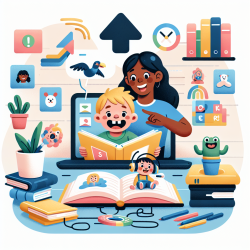As Special Education Directors, we constantly seek innovative methods to enhance the educational experiences of children with special needs. The recently published research article, "Book-Sharing for Toddlers with Clefts (BOOST): Protocol for a randomized controlled trial of a remote intervention to promote language development in children with cleft palate," offers valuable insights into improving language development in children with cleft palate through remote interventions.
Children with cleft palate often face significant language delays compared to their peers. The BOOST study aims to address these disparities by testing a parent-focused, remote intervention designed to enhance language outcomes. This blog will explore the key findings and practical applications of the BOOST program for practitioners in special education and speech therapy.
Understanding the BOOST Program
The BOOST program focuses on dialogic book-sharing (DBS), a technique that encourages active engagement between parents and children during reading sessions. The intervention is delivered remotely via three 50-minute Zoom sessions, making it accessible to geographically dispersed families. Parents are trained to use DBS strategies, which include:
- Encouraging child verbalizations
- Reflecting and expanding on the child's language
- Promoting conversational turns
Parents record and upload videos of their book-sharing sessions, which are reviewed by interventionists to provide feedback and assess adherence to the program.
Key Findings and Practical Applications
The BOOST study's preliminary results suggest that children in the intervention group exhibit better expressive and receptive language skills than those receiving standard care. These improvements are mediated by increased frequency and quality of parent-child reading interactions. Practitioners can implement these findings by:
- Encouraging parents to engage in regular book-sharing sessions with their children
- Providing training on DBS techniques during parent meetings or workshops
- Utilizing remote platforms to deliver interventions and monitor progress
Encouraging Further Research
While the BOOST study offers promising results, it also highlights the need for further research in this area. Practitioners are encouraged to explore additional strategies for promoting language development in children with cleft palate and other language delays. Potential research areas include:
- Adapting DBS techniques for different age groups and developmental stages
- Investigating the long-term effects of remote interventions on language outcomes
- Exploring the impact of cultural and linguistic diversity on intervention efficacy
By staying informed about the latest research and continuously refining our practices, we can provide the best possible support for children with special needs.
To read the original research paper, please follow this link: Book-Sharing for Toddlers with Clefts (BOOST): Protocol for a randomized controlled trial of a remote intervention to promote language development in children with cleft palate.










